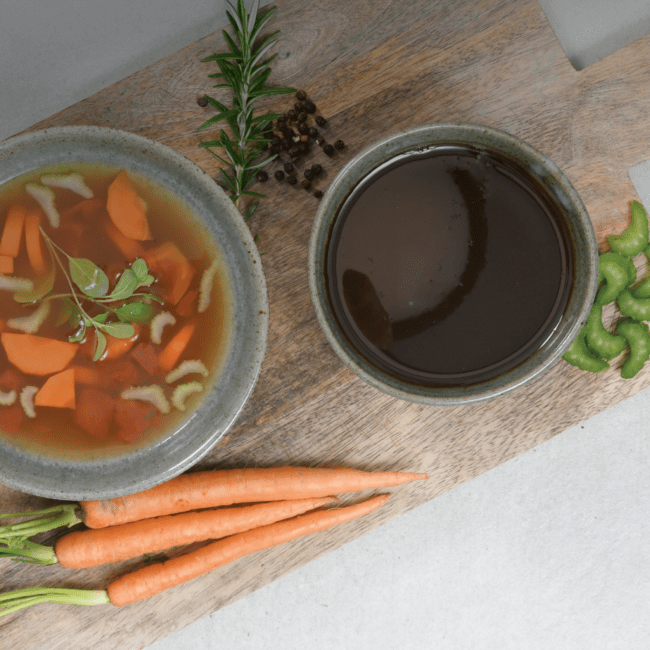While function is vital in a food ingredient, flavour is a must. Our broths, stocks, and bone extracts are crafted in an extracts’ kitchen, artisan-style. We use the same process chefs have used to make stocks and broths for hundreds of years – it’s a really traditional process which means it’s quite natural – all we’re doing is cooking in water. We have the ability to pressure-cook which not every cooking plant has. This is a big advantage as it allows us a lot of scope to tailor product for the customer – both in nutritional and flavour profiles. The pressure cooking is key as to reach temperatures above 100 degrees, you’ve got to do it under pressure. We use the same mechanism as a domestic pressure cooker – It has a lid that’s sealed enabling the pressure to build up.
What does pressure cooking actually do to the ingredients?
The main occurrence at a higher temperature is you solubilise more of the proteins. So when we’re creating a simple bone extract (no vegetables), maximising the amount of soluble protein means we get as much of the goodness as you can out of the bone. We’re looking for an end result when it comes to nutritional and flavour profiles and we’ll tailor the cooking time to achieve that end result – usually anything between 3 to 14 hours. After about 14 hours you’ve maximised extraction from the bones in the pressure process. If we weren’t pressure cooking you’d be looking at around 3 days to get the same level of extraction of nutrients.
The magic in the Maillard reaction . . .
Another key benefit of pressure cooking is flavour development. There’s a well-known flavour reaction known in chef’s circles as a ‘Maillard’ reaction. It’s the master step when it comes to our delicious flavours. Essentially this is a reaction that occurs between proteins and sugars. It’s what creates a lot of the flavours that are in a lot of different foods.
For the proteins and sugars to react together they have to cook at a high temperature – above 100 degrees. A lot of the really rich flavours across our portfolio of food ingredients are due to the Maillard reaction. If we couldn’t pressure cook we couldn’t develop the flavours we want to. We essentially want to extract the protein from the meaty bones and we’re adding vegetables to provide the sugars – that’s their main purpose. While there are vegetable flavours present, it’s those sugars and proteins coming together and combining through the Maillard reaction to create a completely unique flavour profile to that of the original vegetables used. For example, you don’t taste one of our broths that’s been made with carrots and recognise a unique carrot flavour – the sugars from the carrot are reacting with the protein and creating a flavour which you don’t really recognise as relating to a carrot at all. It acts as a catalyst for the flavour and is another reason pressure cooking is really important here at Taranaki Bio Extracts
Automation has its’ place . . .
The key elements in our cooking process are temperature, time and pressure. But what happens after the cooking process is just as important. Typically, we want to concentrate the broth in order to concentrate the flavour and nutrients. The first step is to remove all the fat from the broth that we’ve created – this is important to do before the concentration process. The second step is the concentration process itself, which is essentially just removing water. To do this in a kitchen a chef would put the pan on the stove and reduce it by boiling the water off. At Taranaki Bio Extracts we do it a little bit differently – we use what’s called a vacuum evaporator. The vacuum provides negative pressure – which drops the boiling point of the water to about 70 degrees so we can boil the stock at 70 degrees to remove water, but due to the low temperature we do not create any more burn-on development for flavours. It keeps the flavour profile intact whilst simultaneously concentrating the flavour. We typically target a 10-fold concentration, so we reduce 100% to 10% of the volume that we started with. The 90% we’ve removed is water and recycled back in our plant. After the concentration process we also have the ability to add the fat back into the product if the end user wishes.
Pressure cooking our export quality beef bones in batches brings out their best, with the benefits of the latest technology to monitor and maximise for premium results.
Ends.
